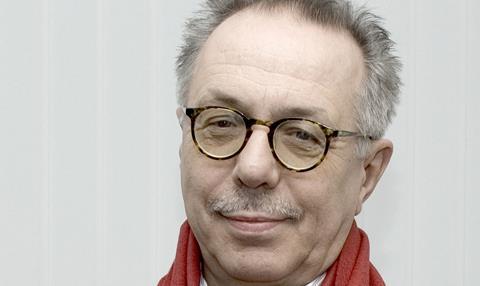Berlinale director discusses Meryl Streep, Fire At Sea and the digital future.

As the 66th Berlin Film Festival (Feb 11-21) enters its final stretch, festival director Dieter Kosslick believes the two “opposing forces” that drive the festival - red carpets and celebrity attendees versus a “line-up with many wild films” - are working well in his view.
While some of the competition entries have taken a hammering, the films of Mohamed Ben Attia, Jeff Nichols, Mia Hansen-Love, Anne Zohra Berrached, Yang Chao and Alex Gibney have all been well received. And Gianfranco Rosi’s documentary Fire At Sea has become the talk of the festival.
“We didn’t want to do a refugee festival, even if we are in the middle of the mess,” said Kosslick. “But we did want to have a festival where the refugee crisis is a big part. The right of happiness - this is a bigger question for the whole world.”
“It was clear when I saw Gianfranco Rosi’s film that it was a masterpiece in terms of telling you the truth,” he continued. “It is so humanistic. We have had 80,000 refugees here in Berlin in six months. We know them, we see them, it’s very close to where I live.”
Criticism of Peace gala
Kosslick once again levelled criticism at the Cinema for Peace gala, accusing the organisers of piggy-backing on the Berlinale by scheduling their event to take place during the festival.
Throwing a copy of a German newspaper down, the festival director expressed his disgust at a full-page image from the previous night’s gala, showing wealthy attendees wrapped in gold space blankets for keeping people warm as a show of solidarity with the refugees’ plight.
“This is one of the most obscene images I have seen in a long time,” said Kosslick, not mincing his words. “Can you believe this? This is what some people are wrapped in before they die and they give them to these rich people to put it on their tuxedos while they’re eating their five courses. This is the most obscene image in the whole festival.”
Brisk sales
At the halfway point of the festival, ticket sales are brisk, with nearly 250,000 tickets having been sold. With a few films still to screen, and the awards on Saturday night (Feb 20), Kosslick is awaiting the final verdict on his competition selection.
“I have learned over 15 years not to worry,” said Kosslick. “The line-up will be judged by the jury and I’m really confident that they will make a good decision.”
Kosslick notes that jury chief Meryl Streep is taking her duties very seriously. On opening night, he sat beside the jury and watched as they all shielded their eyes when clips of the line-up played on the screen.
“I said to Nick James, ‘What are you doing? This is our line-up - you will be seeing all these films!’ He said, ‘Meryl asked us to hide our eyes because she doesn’t want us to be influenced by anything before we see the films.’”
Coffee with Meryl
While he avoids interacting with the jury during the festival, Kosslick did have a coffee with Streep at the start, revealing that they’d avoided talking about films but had discussed US press reports that the actress herself had convened this year’s Berlin jury (eliciting criticism of its all-white make-up). “Convening the jury is the job of the festival director since 1951,” he laughed.
“It is a big deal for us to have her here,” he added. “It started four years ago when she won the lifetime achievement award, and we talked about Berlin and how she liked all the art and culture and how she’d like to come back if she had more time. We thought, ‘Maybe this is a hint.’ When we asked in the autumn, her response was very quick.”
Keeping pace with new platforms
Kosslick doesn’t believe that the proliferation of platforms and changes in audience habits will have a long-term impact on the importance of festivals, but he does think festivals need to keep pace in terms of exploring different types of programming.
“Nothing is replacing what we are doing here,” he said. “It’s like books - the revival of books is big. Everyone thought people would only read on Kindle but if you only have a Kindle in your huge bookshelf in your living room, it doesn’t look good.”
The Berlinale is already keeping pace. Berlin city centre has a glass fibre network for high-speed broadband, and the festival has its own bespoke edition, installed by telecommunication firm Colt. For the first time, the complete Berlinale catalogue is only available online. And the festival held the first digital laser screening in its history on February 15. “We are digitally prepared for this new world and we will keep following this,” he said.
Digital players won’t “replace classic models”
With productions from Netflix (for the third year running), Amazon and HBO all featured in this year’s line-up, Kosslick noted that “we also have to keep following the new production and distribution powers. But this will not replace the classic models.”
“As a festival director, I have no problem if the surrounding meshes of a film are done in different ways than the old distribution system. Maybe the reaction to all the new ways that people watch films - from downloads to their watches - is that the line-ups, including the competition line-up, will become more artistic because it is a chance to present and see something you maybe will never have a chance to see afterwards in the mass media.”
“When we have an eight-and-a-half hour film in competition [Lav Diaz’s A Lullaby For The Sorrowful Mystery],” he added, “you have to believe in what you’re doing.”
TV strand
Berlin’s TV strand is here to stay. This year, it ran across two days, February 16 and 17, and Kosslick would like to add a third day. “We won’t make it any smaller than what we already have,” he said.
Whether this year’s line-up ends up being labelled strong or weak won’t be known until after all the prizes are handed out, and final attendance figures are revealed. But Kosslick is determined to remain sanguine whatever the outcome.
“I’m a normal person so I don’t like it if I’m criticized,” he smiled. “But don’t go in the kitchen if you can’t bear the heat. I cannot be destroyed each day if someone writes, ‘It’s a weak market.’ I can just say, ‘Yes, it is a ‘week’ market - a whole week. I know this.’”

















![2026_FORUM_LETTER TO ALVIN_Main still[59]](https://d1nslcd7m2225b.cloudfront.net/Pictures/100x67/6/9/5/1469695_2026_forum_lettertoalvin_mainstill59_712728_crop.jpeg)





No comments yet